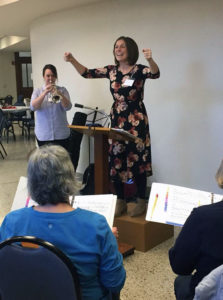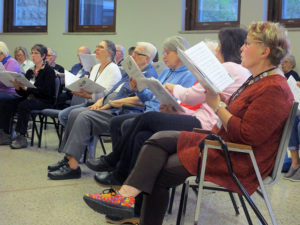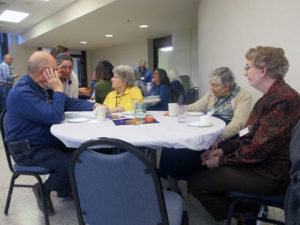When the Singing Hills Chorus takes the stage at a concert, they look like any other choir. The members are clad in crisp white shirts and black trousers, with festive purple scarves tucked around their necks. They step onto the stage, segregating themselves into groups of sopranos, altos, tenors and basses.
Each singer holds a white music folder, patiently waiting for choir director Kristin Ziemke to cue them in for their first piece. When they begin singing, their voices swell and fill the concert space in perfect harmony.
They look like a typical choir. They sound like a typical choir. But there’s something very special about this choir, indeed.
Singing to remember
The Singing Hills Chorus was founded with a special mission—to be a place where people living with Alzheimer’s or other dementias can fellowship in a singing-based community. About one-third of the group’s members have some sort of memory condition, while the rest of the singers are either caregivers or volunteers.
“A lot of times with this disease, people focus on the loss,” said Sandi Lubrant, Program Director at ACT on Alzheimer’s. “But there are assets and abilities that still exist, and I think it’s really important to figure out how to tap into it.”
Instead of losing friends, people are making friends. We’re getting to know each other’s stories. We’re laughing together and eating together. Alzheimer’s disease often changes relationships that people have, so to be in a place that’s so accepting and full of love, it’s really important.–Sandy Lubrant

ACT on Alzheimer’s is a volunteer-driven nonprofit that has chapters across Minnesota. According to Lubrant, members of the ACT group were inspired by a Twin Cities-based choir called the Giving Voice Chorus, which was created to offer people with different dementias, as well as their caregivers, a place to sing and socialize together.
“Instead of losing friends, people are making friends,” Lubrant said. “We’re getting to know each other’s stories. We’re laughing together and eating together. Alzheimer’s disease often changes relationships that people have, so to be in a place that’s so accepting and full of love, it’s really important.”
Janesville native Kristin Ziemke acts as the choir’s music director. She earned an undergraduate degree in music therapy from the University of Wisconsin-Eau Claire and said she appreciates being able to use her skills in a different way.
“This choir has been just a God-send,” she said. “I love that this choir lets me branch outside of my music therapy [background], but I get to use a lot of my music therapy skills within it.”
Growing and blossoming
According to Ziemke, there wasn’t a lot of interest when work began to organize the choir, but membership has taken off ever since its official start in September 2017. The first concert, held in December 2017, had about 26 people performing, and the numbers have grown for every session since then. The latest concert, held Jan. 5, had 46 participants.
Cheryl Lamoureux and Kristi Krengel are a mother-daughter team who have been singing with the choir since its first season. Krengel acts as caregiver to her mother, who is in the early stages of Alzheimer’s. They said they have both found a welcoming community that accepts them for who they are and what they bring.

“There’s a sense of community and freedom in knowing if you make a mistake, it’s okay,” Krengel said. “You don’t have to worry about messing up. It feels safe here.”
“You’re accepted for what you can bring,” Lamoureux agreed. “There’s a feeling here of acceptance, love and affirmation with this group. I just love it. I look forward to this day every week.”
Ziemke explained that the choir tries to keep a 1-1-1 ratio: one caregiver and volunteer for every singer living with dementia. In fact, she said they’ve actually had to stop taking volunteer singers recently so that they can keep their ratio. She said that they plan to cap the choir at 50 participants total to ensure it doesn’t outgrow the “community” feel, though she added that they would be interested in starting a second choir if the demand is there.
“We knew it just needed time to blossom,” Ziemke said. “People struggle with feeling confident enough to come experience it, but once they’re in, they’re in.”
Mankato resident Jan Adams has been volunteering with the chorus since it began. She said she has sung in choirs before and enjoyed it, but she has never enjoyed another choir as much as this one.
“When I walk in the door of our practice room, I just get this infusion of joy,” she said. “I’m bolstered all day and some of the next day when I go. There’s a big hole in my week if I can’t go.”
Always singing
The Singing Hills Chorus divides its time between two 14-week sessions in the spring and winter, each culminating in a concert, as well as a more informal “get together” session in the summer.

The choir’s leadership team meets a few months prior to each concert to brainstorm about music and come up with a theme, with the goal of offering participants a range of music that is both enjoyable and challenging. Part of this is including pieces that have two- or three-part harmony, as well as some songs most of the choir members are unfamiliar with. There are usually around 14 songs per concert.
“We try to choose music that promotes joy,” Ziemke said. “If there’s one thing that I can say about the choir, it is a joy-giving experience. From the rehearsal to the music we choose, to the social time before and after, it’s about creating a joyful experience that promotes friendships, that stimulates cognitive health and helps [our singers] accomplish something that maybe they thought they couldn’t accomplish.”
Ziemke said the choir has all levels of singers, from people who have never sung in a group to people who have years of experience. They also have all levels of dementia progression. Because of this, Ziemke and her leadership team adapt the music to everyone’s individual needs, whether that’s creating a CD or writing out lyric sheets.
“As the disease progresses, we’re able to progress with them and give them the modifications they need,” she said.
Rehearsals are every Thursday morning in the School Sisters of Notre Dame’s basement, with a social time before and after. Four sisters are currently singing with the choir, along with their four caregivers.
“We are so honored to be in their home,” Lubrant said. “They have just welcomed us. That’s a really beautiful relationship.”
Ziemke said, in many ways, rehearsals are just like rehearsals at any other choir; she works with members on diction, volume, breath support and other musical elements. However, she also modifies the way she directs to make it more appropriate for her members, such as doing things at a slower pace or providing moments to pause and really grasp the information.
“We’re working on the same goals as your average choir, but we may pace it a little differently,” she explained.
A place to belong
According to Ziemke, the most important part of the choir is simply offering people a place to form new relationships in a safe space—whether the singers have memory conditions, are caregivers or are simply volunteers.
“We’ve seen friendships develop,” she said. “We’ve seen people say, ‘I needed to be here this week. I needed to come back because I needed the joy that it brings. I look forward to Thursday. It’s the best day of my week.’”
“They just become different people,” Adams agreed. “The joy that’s on their faces…. money can’t buy it. It’s just been amazing to me. There’s so much joy that this choir gives to them. You have to be there… Come one time for 15 minutes, and you’ll feel it. It’s a real special place.”
Adams is quick to share how the choir has taken care of her, too—such as last winter, when members banded together to drive her to and from practice after she slipped walking on icy pavement in the parking lot. She said from then on, a fellow member always calls to schedule a ride to practice, while another member takes her home afterwards.
“To have someone make the effort for me made me feel so honored and special, that someone would care enough about me to do that for me,” she said. “It’s not a real big thing, but it is to me.”
This article first appeared in Southern Minn Scene Magazine.
How music affects our brain
According to Ziemke, music is unique in the way it affects people’s brains, because it creates activity across all areas and stimulates productive cognitive processes.
“Music activates our brain in a very special way,” Ziemke said. “It’s an opportunity to be silly together, to dance together and to have fun. [Our choir members] are living with a disease that is constantly causing deterioration. With this choir, you can create friendships and also challenge your mind and keep it as sharp as you possibly can.”
“Music is stored deeply in the brain, and so are emotions,” Lubrant added. “When people can come together and experience joy and love and music for a morning, it’s just something that carries over for people. [Singing Hills Chorus] is a really quality program designed for adults that helps people thrive and be surprised by what we can accomplish.”
Joining the choir
- Fall Rehearsal Dates: Thursday, September 5-December 12, 2019 (no rehearsal November 28).
- Rehearsal Time: 10am-11:30am
- Social Times: 9:30am-10am & 11:30am-noon
- Where: School Sisters of Notre Dame, 170 Good Counsel Drive in Mankato
- Cost: $25 per person (scholarships available)
- To register: Visit singinghillschorus.org, call 507-519-0626 or email katoactonalz@yahoo.com
- Concert: Saturday, December 14, 2019 1:30pm
- Celebration breakfast: January 9, 2020
Registrations are accepted at any time if space is available. However, singers are encouraged to sign up prior to the beginning of the session.
The School Sisters of Notre Dame
It may not be surprising but Singing Hills Chorus is not the first time the School Sisters of Notre Dame in Mankato have worked towards supporting people living with Alzheimer’s and other dementias.
The sisters were part of a pilot study that focused on aging, started by Dr. David Snowden in the late 1980s. By the 1990s, the doctor had expanded his study to include Alzheimer’s disease. The “Nun Study” opened to all School Sisters of Notre Dame provinces across the U.S., with a 66 percent participation rate. Sisters are evaluated yearly with memory tests and physical functioning assessments, among other things, and 98 percent of participants also agreed to donate their brains after they died. The study continues today, with three sisters living who are still enrolled.
“I’m really amazed by the contributions that the sisters have made for Alzheimer’s disease research,” Lubrant said. “For them to say yes, come be here, and open their home to us, I love the energy.”



